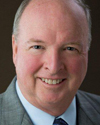Doug Pitts, CEO of a solar-thermal power development firm, noted a strong track project track record outside the US but not domestically. "It's still too expensive," he said, noting a 30% cost premium. "I thought the market would be in the Southwest US, but it turned out to be in Australia and India," he said.
Executives saw potential in distributed generation for universities or hospital complexes. John Spisak, CEO of Sola River, a Colorado-based off-grid power developer, noted more work in getting military bases "off the grid," he said.
Jack Hand, CEO of Power Engineers said sustainability still needed a "commercial definition," but noted that he is involved in an effort by the American Council of Engineering Companies to develop a "clean energy standard."
Contractors and Non-US Firms Weigh In
Panels of construction firm CEOs and leaders of non-US based companies, more recent additions to the EFCG conference agenda, also shared new market and business risks they face ahead.
 |
| RYAN |
"It’s very scary," said Ryan. "You may have to pass on a contract with that kind of language or put in significantly higher prices. Non-financial terms can be more onerous to firms.”
While 108 surveyed firms said they plan to expand international operations in the next five years, global economic uncertainties won’t make it easy.
Bertrand Van Ee, chairman of Holland’s Royal Haskoning/DHV, said “Public spending is down all over Europe and real economic reform never took place. Deficits will keep growing until financial markets say enough is enough.”
Added Flemming Pederson, retired chairman of Denmark engineer Ramboll: “Flat is the new growth.”
Some firms remained optimistic about opportunities in China. Neil McArthur, CEO of Dutch engineer ARCADIS said the country’s top 50 cities “still have a GDP equal to Germany’s.” He sees the slowdown as “temporary.”
 |
| SHOIRY |
Many foreign firms see the US as strong. Montreal-based Genivar/WSP sees it as its “biggest growth market,” says CEO Pierre Shoiry.
But he says engineers are losing out in influencing public-private partnership decisionmaking to “management consultants and accountants."
'Clean Business'
CEOs voiced stronger commitment to better anti-corruption approaches. “It’s black and white, there’s no gray,” said Royal Haskoning/DHV's Van Ee. “Clients want security that they can do clean business. ”
Added Louis Berger International President Jim Stamatis: “If you’re hiring individuals in a country not familiar with [western] corruption rules, you need an aggressive training program. A website is not enough.”
Referencing the Canadian firm’s ongoing legal issues over corruption involving use of “agents” in some foreign countries, new SNC Lavalin CEO Robert Card said putting the controversy “behind us soon” was a key goal.
Card said about 6,000 of the firm's 36,000 global employees working in about 100 countries, are not "literate to our standards” , referring to business conduct.
He noted the firm’s new corruption website hotline as its “first arc of defense,” but admitted that “we’ve not yet gotten a lot of hits."
Chris Ryan, CEO of Geo-Solutions Inc., noted a case still winding through Texas courts involving a battle between a contractor and owner over “no damage for delay” terms in a contract.









Post a comment to this article
Report Abusive Comment